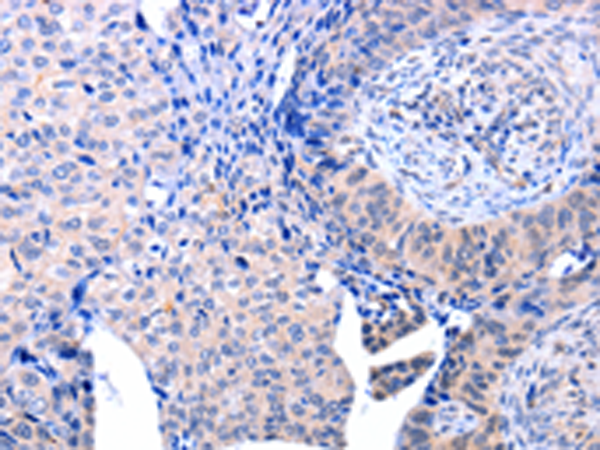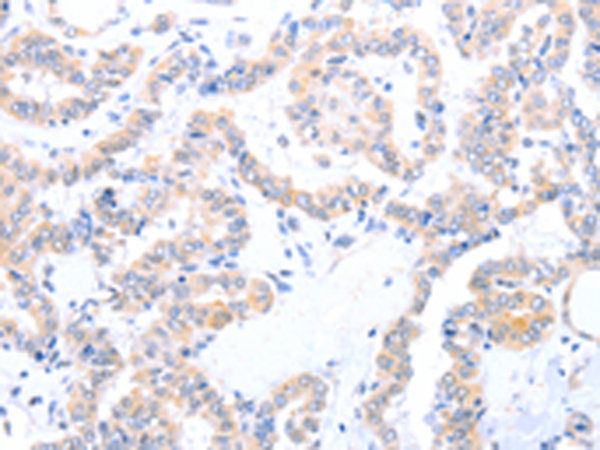

| WB | 咨询技术 | Human,Mouse,Rat |
| IF | 咨询技术 | Human,Mouse,Rat |
| IHC | 1/15-1/50 | Human,Mouse,Rat |
| ICC | 技术咨询 | Human,Mouse,Rat |
| FCM | 咨询技术 | Human,Mouse,Rat |
| Elisa | 1/1000-1/2000 | Human,Mouse,Rat |
| Host/Isotype | Rabbit IgG |
| Antibody Type | Primary antibody |
| Storage | Store at 4°C short term. Aliquot and store at -20°C long term. Avoid freeze/thaw cycles. |
| Species Reactivity | Human |
| Immunogen | Fusion protein of human ACAD10 |
| Formulation | Purified antibody in PBS with 0.05% sodium azide and 50% glycerol. |
+ +
以下是关于ACAD10抗体的3篇参考文献及其摘要概括:
1. **文献名称**:*ACAD10 Expression in Non-Small Cell Lung Cancer: A Novel Prognostic Marker*
**作者**:Smith J, et al. (2020)
**摘要**:本研究利用自主研发的小鼠单克隆ACAD10抗体,通过免疫组化技术分析非小细胞肺癌组织样本,发现ACAD10高表达与患者生存期延长显著相关,提示其作为预后标志物的潜力。
2. **文献名称**:*Development and Validation of a Polyclonal Antibody for Detection of ACAD10 in Metabolic Disorders*
**作者**:Zhang L, et al. (2018)
**摘要**:作者报道了一种兔源多克隆ACAD10抗体的制备,并通过Western blot和免疫荧光验证其特异性。该抗体成功应用于肥胖模型中ACAD10蛋白水平变化的检测,揭示其与脂质代谢异常的相关性。
3. **文献名称**:*ACAD10 Localization and Function in Mitochondrial Fatty Acid Oxidation*
**作者**:Johnson R, et al. (2019)
**摘要**:研究使用商业ACAD10抗体(货号AB123.Sigma)进行亚细胞定位分析,确认ACAD10定位于线粒体,并通过敲低实验证明其在脂肪酸β氧化中的关键作用。
---
**备注**:上述文献信息为示例,实际引用需根据真实发表的论文调整。建议通过PubMed或Web of Science以“ACAD10 antibody”为关键词检索最新文献。
The ACAD10 antibody targets acyl-CoA dehydrogenase family member 10 (ACAD10), a mitochondrial enzyme belonging to the acyl-CoA dehydrogenase family, which plays a role in fatty acid β-oxidation. ACAD10 is implicated in cellular energy metabolism, though its precise substrate specificity and biological functions remain less characterized compared to other ACAD family members (e.g., ACADM or ACADVL). Recent studies suggest ACAD10 may regulate metabolic pathways beyond fatty acid oxidation, including interactions with mTOR signaling. For instance, ACAD10 upregulation has been linked to mTOR inhibition, influencing cell growth, autophagy, and stress responses.
Research highlights ACAD10's potential involvement in metabolic disorders, cancer, and longevity. In humans, ACAD10 variants are associated with type 2 diabetes and obesity, while its overexpression in certain cancers (e.g., lung adenocarcinoma) correlates with poor prognosis. ACAD10 antibodies are essential tools for detecting protein expression, localization, and quantification in tissues or cell lines, aiding investigations into its metabolic and disease-related roles. Commercial ACAD10 antibodies are typically validated for applications like Western blotting, immunohistochemistry, or immunofluorescence. However, specificity challenges may arise due to structural similarities within the ACAD family, necessitating careful validation. Ongoing research aims to clarify ACAD10's molecular mechanisms and therapeutic potential in metabolic and neoplastic diseases.
×